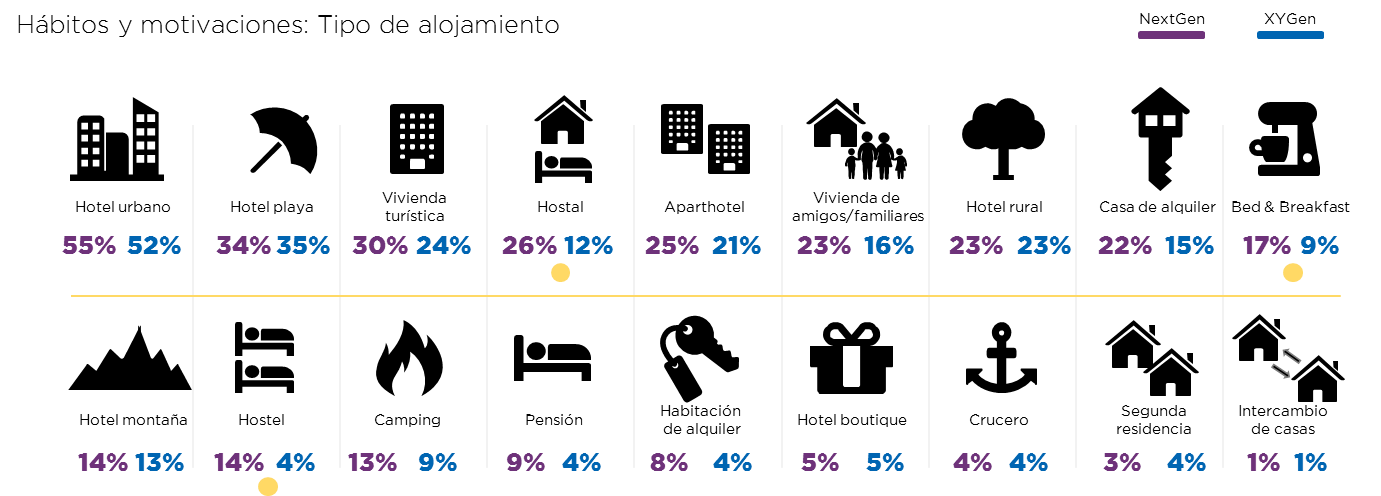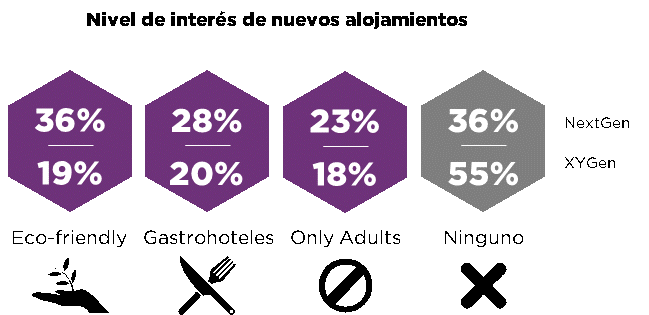BRAINTRUST, la consultora multinacional española especializada entre otros sectores en el turismo, ha analizado el impacto que la llegada de las nuevas generaciones de viajeros está teniendo en la industria hotelera.
“Existe un cambio de concepto de alojamiento aparejado con las nuevas generaciones. Más allá de la ubicación y el precio, los jóvenes comprenden el alojamiento más como un medio que como un fin. Poco parece importarle a este tipo de viajeros los servicios adicionales que ofrezca un hotel ni el trato personalizado. Vivir el destino como un autóctono llama más la atención de estas nuevas generaciones que van a obligar a la industria hotelera a tener que replantearse y reconvertir su oferta”, afirma Ángel García Butragueño, Co-Director del Barómetro Turístico y Responsable de la División de Turismo y Ocio en BRAINTRUST, que asesora a las empresas turísticas en el conocimiento de los viajeros y cómo de esta forma pueden maximizar sus estrategias llevándolas a las cuentas de resultados.
Un 33% del presupuesto de los jóvenes se destina al alojamiento, que lo utilizan como un medio y no como un fin en sí mismo.
El alojamiento es la categoría que genera más gasto entre los viajeros NextGen, aunque muy por debajo del resto de viajeros. La media de gasto del NextGen por viaje se sitúa en 683€, del que un 33% se destina al alojamiento.
Las nuevas generaciones de viajeros buscan siempre el precio más bajo, compran por Internet, un 52% realiza la reserva de su alojamiento desde el móvil (frente a un 36% de las generaciones anteriores), gestionan su consumo a través de apps y no necesitan un trato especial a la hora de ser atendidos.
Siendo menos fieles al alojamiento (54% frente al 63% de los mayores de 40 años), la elección la hacen en función de la ubicación, la comunicación del alojamiento respecto a lugares de interés y la posibilidad de disfrutar de experiencias diferentes, lo que les lleva a sentirse atraídos por espacios menos tradicionales que los hoteles, aspecto éste que muestra que otros tipos de alojamiento como las viviendas turísticas, han llegado para quedarse.
Alojamientos bien comunicados que ofrezcan experiencias
Pese a que el hotel urbano y el hotel de playa siguen siendo los alojamientos más demandados entre los viajeros en general, los NextGen tienden a reservar más establecimientos del tipo hostal, vivienda turística, bed & breakfast y hostel que los de edades superiores.

Los alojamientos eco-friendly y gastro-hoteles también son más interesantes para los viajeros NextGen, y además hacen más uso de los conceptos sólo adultos, por ejemplo.

Por el contrario, los restaurantes o los servicios adicionales del hotel tienen menor relevancia para los jóvenes.
La tecnología un elemento clave
Como era de esperar los jóvenes encuestados por BRAINTRUST declaran que la tecnología es un elemento fundamental en su vida. Así un 67% manifiesta comprar productos on line, un 63% ve series y películas a través de plataformas en streaming, un 58% hace uso de apps, y casi un 30% organiza su vida a través de dispositivos electrónicos que permiten hacer su día a día más fácil.
Esta propensión que tienen Millennials y Z’s al uso de la tecnología, también se ve reflejada en la organización y gestión de sus viajes, siendo los que mayor uso del móvil hacen, ya sea para buscar restaurantes, direcciones o lugares de interés, así como para compartir su experiencia en redes sociales.
Las nuevas generaciones son un público que viaja a lo largo de todo el año y ayudan a la desestacionalización
Uno de los objetivos del sector turístico en España es la ansiada desestacionalización de los viajes, que mayoritariamente se solían concentrar en épocas muy concretas, como verano, Semana Santa y Navidad. El estudio realizado por BRAINTRUST revela que el público joven es uno de los grandes aliados para conseguir dicha desestacionalización, de hecho, sólo un 28% de sus viajes los realizan en los meses de julio y agosto, no bajando ningún mes del 5% con porcentajes cercanos al 10% en meses tradicionalmente valle como octubre, marzo, junio o diciembre.
Es por tanto un objetivo claro de las empresas turísticas que debe ser tenido en cuenta, y ser objeto de sus comunicaciones, si bien deben transformar las mismas para viajeros que son más promiscuos y menos fieles a las marcas, y más asiduos de los blogs, foros y redes sociales.
Para José Manuel Brell, Co-Director del Barómetro Turístico y Responsable de Estudios y Modelos Cuantitativos en BRAINTRUST “El interés por los nuevos modelos de alojamiento viene determinado por la búsqueda de estos jóvenes de vivir algo diferente en sus viajes. Diferenciarse con elementos que vayan más allá del precio, creando conceptos novedosos y claramente experienciales, donde prime la inclusión del viajero en las comunidades locales, el uso de la tecnología en la gestión del viaje, o la facilidad de reserva y de pago, será clave para el éxito de los agentes de la industria hotelera en los próximos años”.









